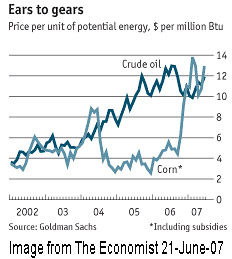Food prices to rise due to energy demand, economic trends
Food prices to rise due to energy demand, economic trends
mongabay.com
December 3, 2007
Income growth, climate change, high energy prices, globalization, and urbanization are converging to drive food prices higher, threatening livelihoods and nutrition of poor people in developing countries, says a new report from the International Food Policy Research Institute (IFPRI).
“Food prices have been steadily decreasing since the Green Revolution, but the days of falling food prices may be over,” said Joachim von Braun, lead author of the report and director general of IFPRI. “Surging demand for feed, food, and fuel have recently led to drastic price increases, which are not likely to fall in the foreseeable future, due to low stocks and slow-growing supplies of agricultural outputs. Climate change will also have a negative impact on food production, compounding the challenge of meeting global food demand, and potentially exacerbating hunger and malnutrition among the world’s poorest people.”
“Economic growth has helped to reduce hunger, particularly when it is equitable,” added von Braun. “But unfortunately, growth does not always reach the poorest people.”
Economic growth in India and China are changing spending and consumer preferences from stable crops to resource-intensive processed food and high-value agricultural products including vegetables, fruits, meat, and dairy. Surging demand for biofuels as an alternative energy source are further pressuring food prices. Sub-Saharan Africa–one of the poorest parts of the world and an area expected to be particularly affected by climate change–would fare the worst from the price increases. More broadly, climate change is expected to affect poorer countries more than industrialized nations. Africa is especially vulnerable due to its reliance on low-input, rain fed agriculture.
 Price per unit of potential energy, dollars per million Btu. Corn price includes subsidies. |
The report outlines five policy recommendations for mitigating the impact of these trends on the world’s poor: elimination of trade barriers by developed countries, increased investment by developed countries in rural infrastructure and market institutions to improve access to critical agricultural inputs, greater funding for agricultural science and technology, enactment of social protection measures that focus on early childhood nutrition, and consideration of agriculture and food issues when setting international climate change agendas.
“As the world food situation is being rapidly defined by new driving forces, including income growth, climate change, and increased production of biofuels, the global community must give renewed attention to the role of agriculture, nutrition, and health in development policy,” said von Braun. “Above all, policies must target the world’s most poor and hungry people, to ensure that they do not get left behind in the wake of overall economic growth and global progress.”
IFPRI web site
This article is based on press materials from IFPRI